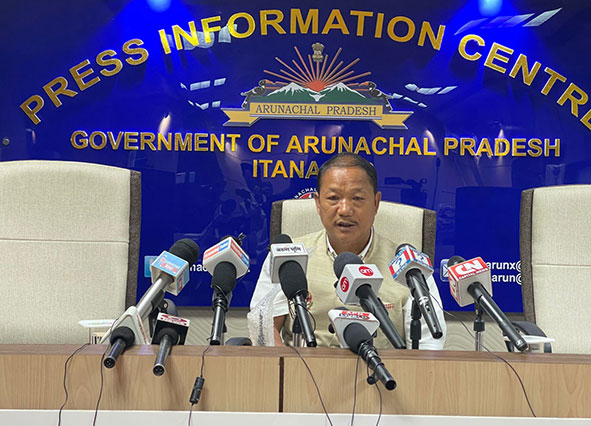Staff Reporter
ITANAGAR, 1 Oct: The Chief Minister Pema Khandu-led state government has decided to devolve power to the panchayati raj institutions (PRI) as per the 73rd constitutional amendment and the 11th schedule of the constitution.
The decision to devolve power to the PRIs with 29 subjects was taken during a cabinet meeting chaired by Khandu on Thursday.
Briefing media persons at the civil secretariat press information centre here on Friday, government spokesperson and Home Minister Bamang Felix termed the decision “historic.”
“The state cabinet agreed for genuine devolution of powers (3Fs) to PRIs as per 73rd constitutional amendment and 11th schedule of constitution (29 subjects),” Felix said.
He added that the sustainable participatory inclusive comprehensive & empowerment (SPICE) model would be adopted in Arunachal Pradesh.
“This is first of its kind in the state and the country. We will see that this model is widely accepted and emulated by other states in future,” Felix stated.
He also informed that a dedicated separate zilla parishad fund under Section 99 (1) of the Arunachal Pradesh Panchayati Raj (Acts and Rules), 2018, shall be created.
Highlighting “the methods and formula of devolution which have been discussed and accepted,” Felix said: “Ten percent of state’s own revenues (SoR) shall be devolved to the PRIs, which will be effected from the next financial year. This will be in addition to the FFC grants.
“This will be in the criteria of population and area based in the ratio of 50:50. Seventy percent would be the basic grants distribution, while 30 percent would be the performance grants based on performance,” he informed.
The spokesperson also stated that “to improve the PRIs, their own capacity to avail funds on performance-based approach, it focuses on ‘gram swaraj to green swaraj’, wherein PRIs will be mandated to perform on conservation and enhance ‘green growth product’.”
“They need to perform on sustainable development goals (SDG). This will be ensured by inclusion of two budgets within the zilla parishad fund – green budget and gender budget – to be included into the zilla parishads’ own budget to avail grants from the state government,” he said.
“However, the detailed formula for devolution of powers and functions across the state, ie, ZPC and GPC segments, will be unveiled on 8 October by the chief minister in Itanagar, in the full attendance of all the ZPCs,” Felix informed.
The plan formulation and implementation by constituting sectoral working committees at the ZP and the GP levels through the zilla parishad development plan and the gram panchayat development plan will be worked out, he added.
Meanwhile, in another important decision, the cabinet approved the recruitment rules for motor transport sub-inspectors’ posts in the Arunachal Pradesh Police (APP).
“The government has taken the decision considering the lack of career progression of ASI motor transport,” Felix said.
He informed that the government had created 24 posts of sub-inspectors in 2019, along with other posts. “Out of 24 posts, 10 posts have been re-designated as sub-inspector motor transport. These 10 posts shall be filled up from the existing senior most assistant sub-inspector drivers, giving succour to many APP drivers,” Felix stated.
The cabinet also approved amendment of the Arunachal Pradesh Excise Rules, 1994, introducing online prepaid/upfront levy of excise duty on alcoholic beverages for bonded warehouses.
“The prepaid levy will ensure realization of excise duty at the point of entry, instead of exit, of alcoholic beverages, which will prevent potential chance of revenue pilferages,” Felix said.
The cabinet further approved enhancement of penalties through amendment of the Motor Vehicle Act, 2019 in the state, in order to lessen the violation of traffic rules and the MV Act.
The cabinet also directed the education department to “assess the need of a third language and dialect of tribes and the requirement of manpower and bring to the government for decision as per the New Education Policy, 2020,” Felix informed.



